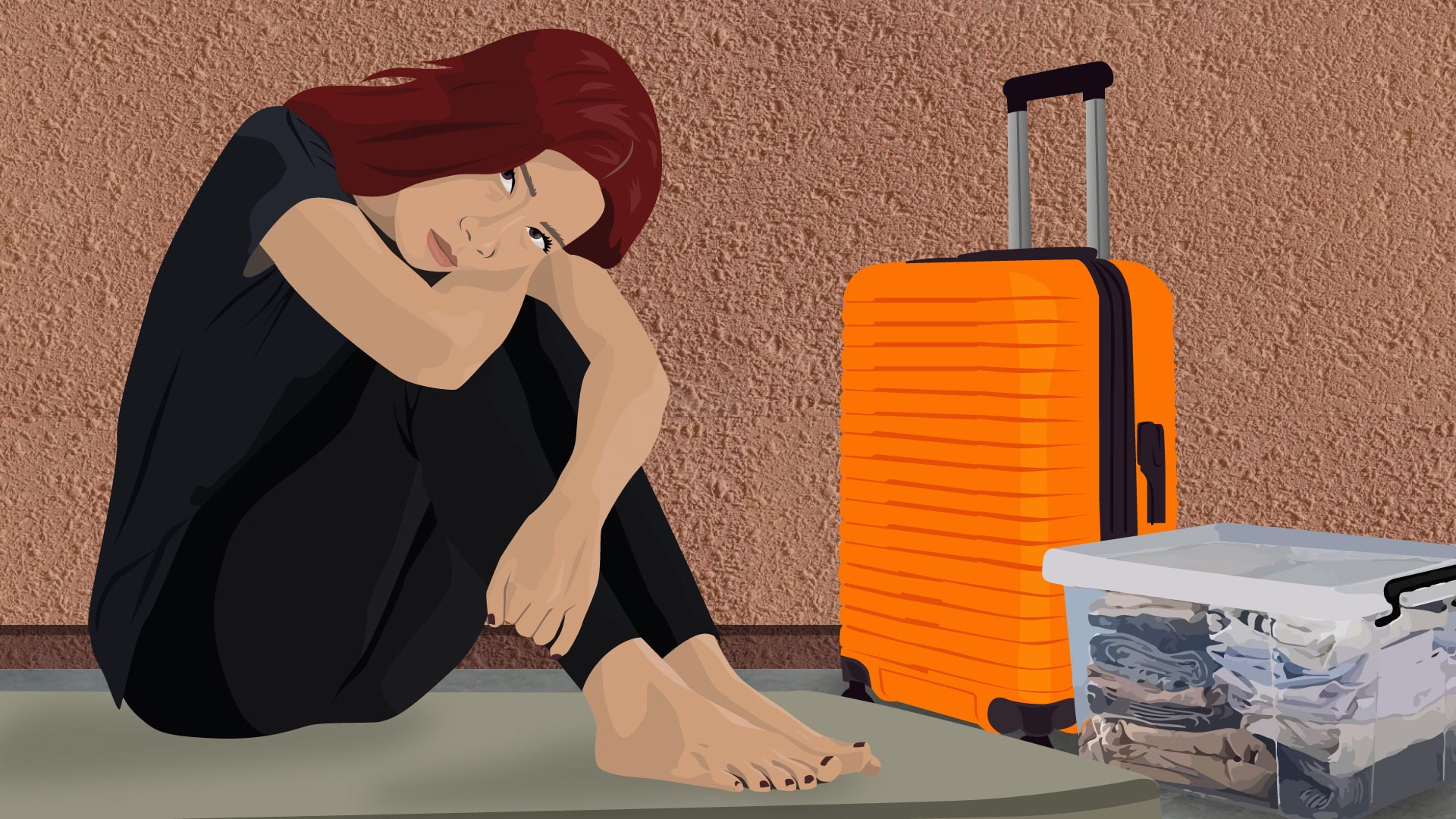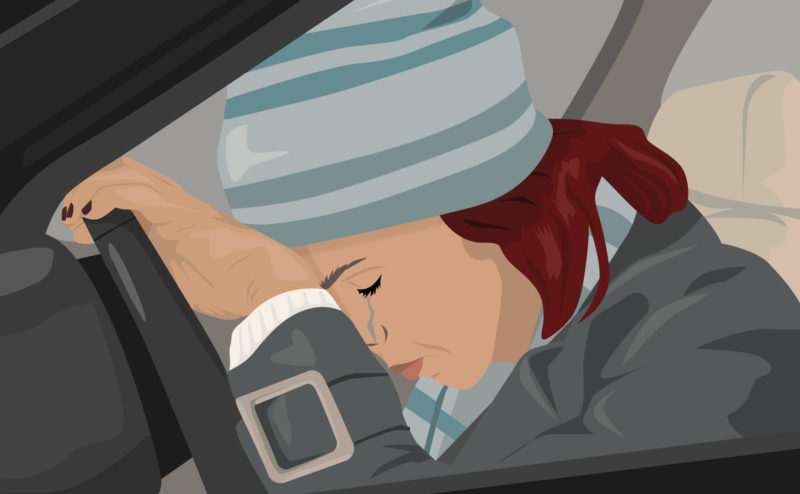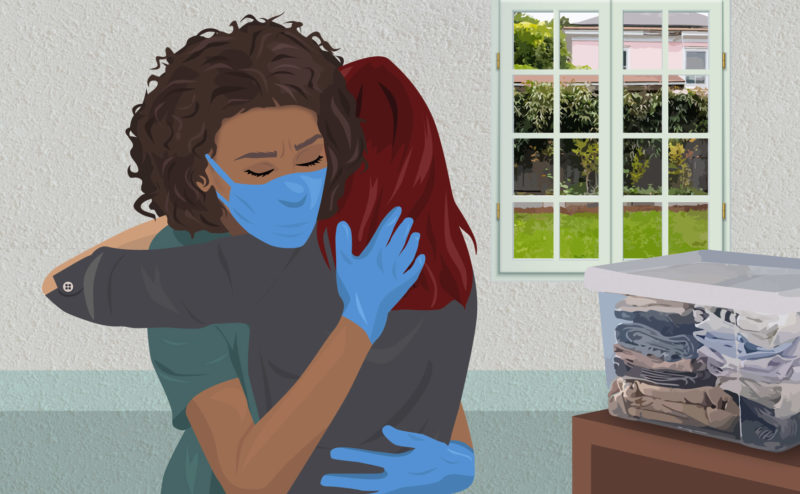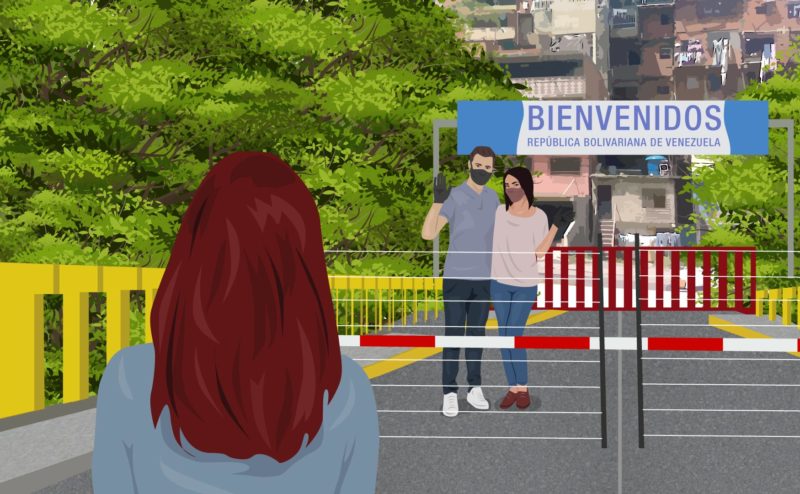

 Having just earned her degree as a medical doctor from the Central University of Venezuela, the protagonist of this story felt she could not find a reason to stay in the country any longer. So, she planned to move to Spain to practice her profession there. On November 24, 2019, she left Valencia, state of Carabobo, for the United States, from where she would be heading to Europe months later. That was the beginning of a journey that she would have to revise more than once.
Having just earned her degree as a medical doctor from the Central University of Venezuela, the protagonist of this story felt she could not find a reason to stay in the country any longer. So, she planned to move to Spain to practice her profession there. On November 24, 2019, she left Valencia, state of Carabobo, for the United States, from where she would be heading to Europe months later. That was the beginning of a journey that she would have to revise more than once.

Arrive in the United States. Make money working underground on a tourist visa. Then head to Spain. That was Nathali Mejia’s plan. No pandemic. No family problems. An idyllic plan. But, like all things idyllic, one that was persistently haunted by adversity. Which is something the 25-year-old girl would experience firsthand when she left Valencia on a plane on November 24, 2019.
She had already had her credentials as a medical doctor validated to practice in Spain. She had graduated from Universidad Central de Venezuela. One year and 20 days later, she finally decided to go ahead with her emigration project when her cousin Mildred confirmed her that she could stay her in her apartment in Orlando, Florida. Withbarely $200 in her pocket, she left for the United States with her aunt and uncle and her brother Daniel, who would set off within a week for Conroe, Texas.
She traded her spacious house in Punto Fijo, Falcón, for half a mattress and2 drawers where she had to arrange her clothes as if they were Tetris blocks. She went from living by herself to sharing a bathroom with three other people, and from escaping the 88 °F heat of her city to enduring low temperatures of 50 °F at her destination.
And, as the weather changed, so did her cousin’s hospitality. With Nathali’s six-month tourist visa ticking down, Mildred started to pressure her to find a job. Every single day she would ask her: “So… What are you going to do?” Even when, to her good fortune, Nathali was not always out of work.
She landed her first job three days later as a housekeeping staff in a hotel. She worked 12-hour shifts cleaning and tidying up rooms and bathrooms, hauling a huge, heavy cart full of linen and supplies. She was paid $3 per room, and eight rooms were all she managed to complete. That is $24, a quarter of the legal minimum hourly wage in Florida of $8.46.
After a week, she did not show up again.
Seven days later, having obtainedher driver’s license,and thanks to her cousin Mildred’s friend Nora, Nathali got a job with a car rental company at the Orlando International Airport. Little did she know thatshe would be working right at one of the points of entry of the coronavirus into the United States, and, therefore, in one of the sectors that would be worst hit by the economic crisis that broke out in March of 2020.
Her first position was as a scanner, checking the condition of the vehicles. Next, she performed as a driver, and then as a security staff in the company’s outdoor parking lots. She would make up to $70,but only if she was allowed to workovertime. And her job wason an on-call basis. It was an unstable job, for sure. It all depended on whether she was sent a text message to let her know what time she would be needed the next day. So Nathali was always glued to her cell phone.
Whatever she earned, she saved to go to Europe.
That’s how she bought her plane ticket. On April 30, she would be setting foot in the Adolfo Suárez Madrid-Barajas Airport.
But her travel plans could begin to unravel.
And not because of the COVID-19 pandemic, which by January 2020 was already raising alarms all across Europe with its death toll and number ofinfections: she had just reunited with Israel, an ex-boyfriend with whom she had had an eight-year relationship and who had been living in the United States for two years. As her feelings rekindled, she almost accepted his proposal to move together and abandon the idea of the trip.
Nevertheless, she refused to pose as a politically persecuted person to apply for asylum just to stay in the country. Furthermore, shecame to the realization that she was a long way from being able to practice her profession in the United States, given the lengthy and costly process to have her medical credentials validated. She stuck to her plan.
But some things started to go sideways.
By mid-March,as then-President Donald Trump announced a series of measures to contain the COVID-19 spread, the text messages she received to report for work became more and more sporadic.
She went from working six days to working five. Then four. Then three. Then two. Then just one. Would she stop working all together?
“Nathali, we are going to be put out of work,” wrote Érika, a fellow coworker from Maracaibo.
“Relax,” Nathali replied.
“See how theystopped calling people?” the woman added, anxious because she did not knowhowshe would do to support her two children.
And her friend’s fears came true. After more than three weeks,Nathali was not called to report for work again.
A question would linger in her mind those days thatseemed to have stretchedfrom 24 to 30 hours: “What now? What now? What now? What now?”It was perhaps the same question that the more than 10 million Americans who had been left without a job over a two-week span because of the quarantine —just as many people as in Portugal—were making themselves.
That’s when life with her cousin Mildred turned into sort of a cold war. Mildred kept insinuating that if Nathali did not contribute money to the household, she should leave. She wanted to control everything Nathali did, and treated her as if she were a maidservant only because she was unemployed. The situation would constantly drive Nathali to tears and made her want to run away from there.
Then, a friend told her about a job opportunity at an auto auction place. It was just what she needed: a job that, although temporary, would help clear the air with her cousin.
She didn’t think twice and took it.
In the meantime, she still had her hopes placed on her trip to Spain. She will be gone any day now and things would get better, she thought.
It didn’t take long for her hopes to be crushed. On March 29, with a short, programmed message, the airline TAP informed her that her flight had been cancelled.
Nathali was shaking as she went over the message a couple of days later. She was driving her cousin’s car. She stopped it, took as deep a breath as she could, dropped her head on the steering wheel and cried her heart out. She was overcome with bitterness. “God, what purpose do you have me here for?” she cried. The echo of her pleads was trapped in the vehicle like steam in a pressure cooker. All she wanted was to open the door and run. Remove the lid and release the pressure. Escape.
That same day, she was approached by a cheerful, talkative, 40-year-old Puerto Rican woman named Kathy. She was riding in the van that Nathali used to take to get to the car auction business. It was raining and the woman offered her some chips and invited her to an evangelical church in Kissimmee, 30 minutes from Orlando, for a Mother’s Day service the next day. She accepted. From that day on, a friendship began to grow that would open her the doors to Kathy’s home when, sick and tired of the problems with her family, she decided to move out.
And she moved without a warning. She did not tell a soul where she was going. She feared her cousin’s reaction. She was convinced that Mildred would not understand why she would move in with people she didn’t know. But she didn’t care. She grabbed her belongings and left. Later on, her cousin would write a message, in retaliation, that read: “Ungrateful” and blocked Nathali on her social media apps.
When Nathali crossed the threshold of Mildred’s house the morning of May 31st, she had already been struggling with an unrelenting headache and severe weakness. She suspected what it was, so she wrote down her every symptom in a notebook. She didn’t say a anything about it then because the word “COVID-19” had been banned from use in her cousin’s apartment. They argued it invited “bad vibes.” She knew it was very likely that she had caught it. Another of her cousins, who lived in the same apartment, had been showing the same symptoms for a while. Nathali took a PCR test at a drive-up site, very similar to a McDonald’s drive-thru.
Within 48 hours of moving out, the result came in the mail: she had tested positive.
Nathali felt as if a gun had been placed in her hands because she was now living with two elderly people: an 86-year-oldprostate cancer patient with a single lung and pulmonary emphysema, and another person who was 65 years old and had prostate cancer too.

“I just wish the ground would open up and swallow me. This family is lending me a hand and now I have COVID-19,” she thought, sobbing, as if she could never run out of tears.
It didn’t worry her that she was asthmatic and that her condition could complicate things for her. Nor was she concerned that she could be left without a roof over her head. She only thought of those elderly persons and the potential threat to their lives if they were infected with the disease.
“Please, forgive me. Please, forgive me,” she insisted to her friend in a video call as soon as she learned she had the virus. Her father, who was also a doctor and lived in Peru, urged her not to comment on her diagnosis, but she just had to.
“Wait for me. Don’t go anywhere,” Kathy told her in a calm voice. “I welcomed you into my house, and we will treat you as family”.
Shivering, Nathali got down on her knees and prayed.
She was in the room she shared with Kathy, a cramped space that held a king size bed and a dresser. She had arranged her suitcases and two plastic containers with clothes in a corner. The room had a window overlooking the parking lot and, far ahead, a grove of trees. She went through it in close detail, now more than ever. She did not want to leave that place again. She felt like a leper.
Late that night, the door opened. It was Kathy, tall and big-boned. Wearing gloves and a facemask, she went in straight to hug her.
“Don’t hug me,” Nathali asked, trying to avoid her. She was crying and a litany of apologies came out of her mouth.
“It’s okay. We are a family and we have put our faith in God,” she replied, holding her tight.
Then, it was Kathy’s teenage son who walked into the room. Wearing gloves and a protective mask, he hugged her too.
“Don’t you worry, sister. You are going to get through this. Everything will be all right,” he soothed her.
Nathali was at a loss for words. She was not a leper, and she was certainly not alone.
She remained locked up in that room for a total of 15 days. The family provided her with food and hygiene products. They made sure she lacked nothing.
In a call that she received from the country’s health authorities, she was advised to take only acetaminophen and water. As a precaution, she bought a stethoscope and a pulseoximeter. She checked her breath sounds herself. She also took the controversial ivermectin, on her father’s recommendation. And she used up what little savings she had in her treatment.
While confined, long video calls with friends cheered her up, and reading The Purpose Driven Life, by Rick Warren, raised her spirits. She was doubtful, but she wanted to believe that nothing in life was a coincidence. Her faith, despite her questioning, dictated to her that it was all God’s plan.
It was a conviction that she carried with her since 2018, when she had to watch her mom, who was as strong as an oak tree, fall apart as her marriage of 26 years ended. Her dad had moved to Peru, where he married an ex-girlfriend from his teenage years after just over a year.
Nathali helped her mom through a deep bout of depression. They shared as much as they could while she completed her mandatory rural practice in Minas de Baruta, Caracas, as a newly graduated medical doctor. She even helped her with her work as a manager of medical services in the country’s prisons. Her mother’s grieving period brought them as close as they had ever been.
Until September 7, 2018.
The night of September 7, 2018, her mother was involved in a motor vehicle accident during a heavy downpour at Bajada de Tazón, sustained a traumatic brain injury, and died.
That is when Nathali felt that she had no reason to stay in the country any longer.
It was also on a September 7 that she had filed the documentation to validate her medical degree in Spain. As she recalled the date, she felt it was more than that: it was an indissoluble bond that connected her mother to her dream. So she told herself she could not falter. She needed to be as strong as her mother had been and overcome any obstacle she might face.
She completed the 15-day quarantine period at Kathy’s and immediately began working as a delivery staff. She asked for a visa extension while she waited for flights to resume, and she did not give up on her goal to move to Madrid.
However, as her US visa deadline approached, and given that the airlines were yet to resume operations, she thought of returning to Venezuela. To do what? She had no clue. Maybe it was to pick herself up and then leave again. Yes, that is exactly what she would do.
She ignored her father’s reproaches when she told him about her decision. She also dismissed four marriage proposals to get a green card, because marriage was precious to her, and did not apply for a tourist visa extension because it involved paying $665 that she could not afford to spend.

In the midst of the pandemic, she took three planes and crossed three bridges to return home through the trails along the Colombia-Venezuela border. On November 12, 2020, she spotted her sister and her brother-in-law on the other side of the Táchira River. Nathali cried again, but this time it was tears of joy. Her plan had not worked out as she had hoped. Still, she was confident that God’s plan had. She did not tell anyone, but she wished her mother had also been waiting for her on that bank of the river to see what an oak tree she had become.
The name of the protagonist of this story was changed at her request.
1 [This translation of a fragment of “La vida”, a poem by the Venezuelan poet Eugenio Montejo, is NOT an official translation and is provided here in for reference purposes only]
Life is the mystery on the boards,
travelers departing or returning,
the fear, the adventure, thetears,
the lingeringfog of a farewell
and the unsulliedplanes that soar
into the heights of desire
Eugenio Montejo
 This story is part of La Ruta del Hambre [The Hunger Route], a publishing project developed by our network of storytellers in the 3rd year of the La Vida de Nos Itinerante training program.
This story is part of La Ruta del Hambre [The Hunger Route], a publishing project developed by our network of storytellers in the 3rd year of the La Vida de Nos Itinerante training program.
1451 readings
“I think with my fingers, armed with 27 letters.” I am a bachelor of communication and media from the University of Zulia. I write about the stories that, every single day, erupt from a sometimes implausible reality.